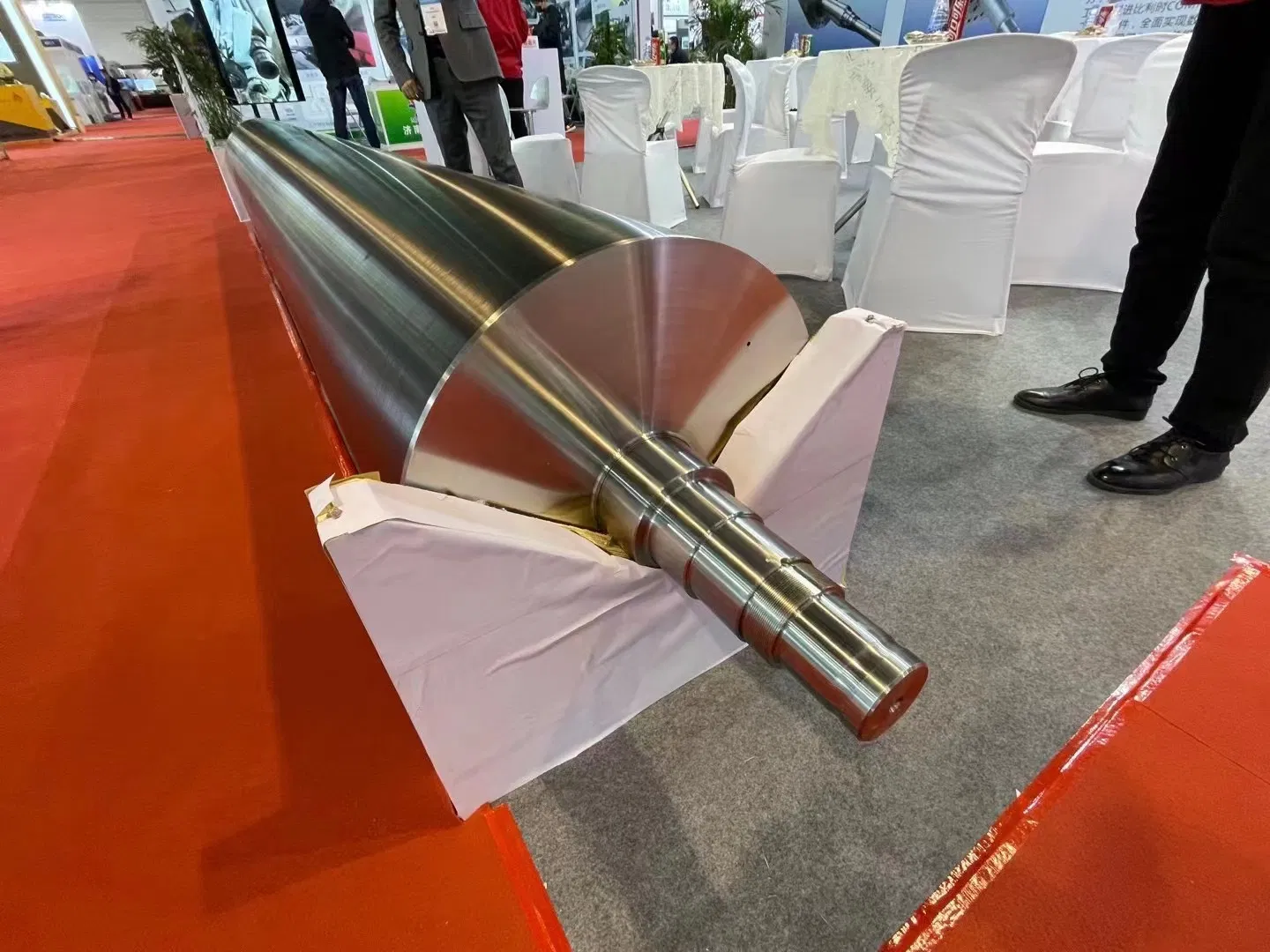Industrial rollers might seem like simple components, but frankly speaking, they are the unsung heroes powering countless manufacturing and processing operations worldwide. From printing presses and conveyor systems to steel mills and paper production lines, these cylindrical components are absolutely critical for smooth, efficient, and reliable performance. The quality, design, and material composition of an industrial roller directly impact production speed, product quality, maintenance schedules, and ultimately, the bottom line. Have you ever stopped to consider the intricate engineering and material science that goes into creating a roller capable of withstanding extreme pressures, temperatures, or corrosive environments? Selecting the right Industrial Roller Maker is therefore not just a procurement decision; it's a strategic investment in operational excellence. An experienced manufacturer understands the nuances of different applications and can provide solutions tailored to specific challenges, ensuring longevity and optimal function. Ignoring the significance of this choice can lead to premature failures, costly downtime, and compromised output – issues no competitive business can afford in today's demanding market landscape. It’s about more than just finding a supplier; it’s about finding a partner in performance.
Understanding the Diverse World of Industrial Rollers
The term "industrial roller" encompasses a vast array of designs, materials, and functionalities, each tailored for specific tasks and environments. It's worth noting the sheer variety available, which highlights the importance of working with a knowledgeable manufacturer. You'll find simple conveyor rollers designed for moving packages, intricate printing rollers requiring absolute precision and specific surface properties, robust rollers for steel processing capable of handling immense heat and pressure, and specialized rollers used in film stretching or coating applications. The demands placed on these components vary dramatically. Some need exceptional wear resistance, others require specific hardness levels, while some must resist harsh chemicals or extreme temperatures. Material selection is paramount – common choices include various steels (carbon, stainless), aluminum, rubber compounds (EPDM, nitrile, silicone), polyurethane, composites, and even specialized coatings like chrome plating, thermal sprays, or Teflon. The internal construction, bearing selection, and balancing are also critical factors influencing performance and lifespan. Understanding these differences is the first step towards specifying the right roller for your unique operational context. A generic, off-the-shelf solution rarely delivers optimal results in demanding industrial settings; customization is often key. Frankly speaking, trying to fit a standard roller into a specialized application is a recipe for inefficiency and potential failure.
The Critical Role of Materials and Coatings
Delving deeper into roller construction, the choice of base material and any applied coatings significantly dictates the roller's performance characteristics and suitability for an application. Steel rollers, for instance, offer high strength and rigidity, making them ideal for high-load applications like metal forming or heavy-duty conveying. However, they can be susceptible to corrosion unless properly treated or made from stainless grades. Aluminum provides a lightweight alternative, beneficial in high-speed applications or where inertia needs to be minimized, though it offers lower strength than steel. Rubber and polyurethane coverings are essential where grip, pressure distribution, or gentle product handling is required, such as in printing, laminating, or material transport. The specific elastomer compound chosen determines its hardness (durometer), resistance to chemicals, abrasion, and temperature. Interestingly enough, advancements in polymer science continually yield new compounds with enhanced properties. Coatings add another layer of functional specialization. Hard chrome plating enhances wear resistance and provides a low-friction surface. Thermal spray coatings (like plasma or HVOF) can apply incredibly hard and durable surfaces (ceramics, carbides) for extreme wear environments. Non-stick coatings like Teflon are crucial in applications involving adhesives or sticky materials. Selecting the optimal combination requires a deep understanding of both the operational environment and the material science involved – expertise a proficient industrial roller manufacturer brings to the table.
Precision Engineering: The Heart of Roller Manufacturing
Beyond materials, the manufacturing process itself is where precision engineering truly defines the quality of an industrial roller. It's not simply about shaping a cylinder; it's about achieving exacting tolerances for dimensions, concentricity, runout, and surface finish. Think about a printing roller – even microscopic variations in diameter or surface uniformity can lead to visible defects in the final print. Similarly, rollers in high-speed web handling lines require near-perfect balance and concentricity to prevent vibrations that could damage the machinery or the product. Achieving this level of precision demands sophisticated machining capabilities, including CNC turning, grinding (cylindrical and surface), and dynamic balancing. Tolerances are often measured in microns (thousandths of a millimeter). Surface finish requirements can range from rough textures for grip to mirror-smooth finishes for coating applications. The straightness of the roller body and the alignment of bearing journals are equally critical. In my experience, manufacturers who invest heavily in state-of-the-art machining centers, meticulous measurement tools (like laser micrometers and profilometers), and rigorous quality control protocols consistently produce superior rollers. This commitment to precision roller engineering is what separates a basic component supplier from a true solutions partner capable of meeting the most demanding specifications.
Key Considerations When Selecting an Industrial Roller Maker
Choosing the right partner to manufacture your industrial rollers involves evaluating several critical factors beyond just the initial price quote. Technical expertise is paramount. Does the potential supplier truly understand your application's demands? Can they offer informed recommendations on materials, design, and coatings? Look for evidence of experience in your specific industry or similar applications. Manufacturing capabilities are another crucial aspect. Do they possess the necessary machinery and quality control systems to achieve the required precision and tolerances? Ask about their machining capabilities, grinding accuracy, balancing standards, and quality inspection processes. Customization ability is often essential. Many applications require tailored solutions rather than standard off-the-shelf products. Assess their willingness and capability to design and produce rollers specific to your needs, including unique sizes, materials, or surface characteristics. This is particularly important for custom industrial roller manufacturing. Lead times and reliability are also vital; production delays can halt your operations. Inquire about typical turnaround times and their track record for on-time delivery. Finally, consider their service and support – are they responsive, easy to communicate with, and willing to stand behind their products? Evaluating these factors holistically will help you identify a reliable, long-term partner.
The Importance of Quality Control and Testing
A commitment to rigorous quality control (QC) and testing throughout the manufacturing process is non-negotiable when producing high-performance industrial rollers. It begins with incoming material inspection, verifying that the raw materials meet the required specifications for composition, hardness, and integrity. During machining, in-process checks are crucial to ensure dimensional accuracy, concentricity, and surface finish requirements are being met at each stage. Tolerances can be tight, and deviations must be caught early. Techniques like coordinate measuring machines (CMMs), laser micrometers, and surface profilometers are often employed for precise measurements. Dynamic balancing is another critical QC step, especially for rollers operating at higher speeds. Unbalanced rollers cause vibration, leading to premature bearing failure, excessive noise, and potential damage to both the machine and the product being processed. Balancing ensures smooth rotation by distributing mass evenly around the axis. Final inspection before shipment provides a comprehensive check of all critical parameters against the customer's specifications and drawings. This meticulous attention to detail, embedded within a robust quality management system (like ISO 9001 certification), provides assurance that the rollers received will perform reliably and meet the expected lifespan. Frankly speaking, skimping on QC is a false economy that invariably leads to higher costs in the long run due to failures and downtime.
Addressing Challenges in Heavy-Duty Roller Applications
Certain industries present particularly challenging environments for industrial rollers, demanding exceptional durability and resilience. Think about steel mills, mining operations, or large-scale aggregate conveyors. Rollers in these settings often face extreme loads, high impact forces, abrasive materials, elevated temperatures, and potentially corrosive conditions. Designing and manufacturing rollers for such heavy-duty roller applications requires specialized knowledge and robust construction techniques. Material selection often leans towards high-strength alloy steels or specially formulated wear-resistant materials. Roller bodies may need thicker walls, and shafts must be engineered to withstand significant bending moments and shear forces. Bearing selection and housing design are critical – heavy-duty sealed bearings are often necessary to prevent contamination from dust and debris, which are common in these environments. Specialized coatings, such as thick layers of hard chrome or wear-resistant thermal sprays, can significantly extend roller life by protecting against abrasion and impact. Moreover, the overall design must account for potential shock loads and ensure adequate structural integrity. Partnering with a manufacturer experienced in these demanding sectors ensures that the rollers are not just components but engineered solutions built to survive and perform reliably under the toughest conditions imaginable. It’s about understanding the physics of failure and designing proactively against it.
Innovation and Future Trends in Roller Technology
The field of industrial roller manufacturing is not static; innovation continues to drive improvements in performance, longevity, and efficiency. Material science plays a significant role, with ongoing development of new alloys, polymers, and composite materials offering enhanced properties like better wear resistance, higher temperature tolerance, or improved chemical compatibility. Advances in coating technologies are also noteworthy, providing more durable, lower-friction, or specialized functional surfaces through techniques like advanced thermal spraying, physical vapor deposition (PVD), and novel polymer formulations. Manufacturing processes are also evolving. Tighter tolerances are achievable through advancements in CNC machining and grinding technology. Automation and sophisticated process controls enhance consistency and quality. Furthermore, the integration of smart technologies is an emerging trend. Have you ever wondered if rollers could monitor their own condition? Sensor-equipped rollers capable of detecting vibration anomalies, temperature spikes, or wear patterns in real-time could enable predictive maintenance, preventing unexpected failures and optimizing service intervals. This shift towards data-driven maintenance strategies promises significant operational benefits. Keeping abreast of these technological advancements allows forward-thinking manufacturers, like our company, to offer cutting-edge solutions that provide a competitive edge to our clients. It's an exciting time for roller technology development.
Why Partnering with the Right Manufacturer Matters
In conclusion, the selection of an Industrial Roller Maker is far more critical than it might initially appear. Industrial rollers are fundamental to the productivity and efficiency of countless processes across numerous industries. Their performance directly impacts output quality, operational uptime, maintenance costs, and overall profitability. Choosing a manufacturer based solely on the lowest price often proves counterproductive, leading to premature failures, costly downtime, and compromised product quality. Instead, the focus should be on finding a partner with proven technical expertise, robust manufacturing capabilities geared towards precision, a commitment to quality control, and the ability to provide customized solutions tailored to specific application requirements. Whether you need standard conveyor rollers, highly precise printing rollers, or robust components for heavy-duty roller applications, the right manufacturer brings invaluable experience and engineering know-how. They understand the nuances of material selection, the importance of tight tolerances, and the specific challenges posed by different operating environments. By collaborating with such a partner, you invest in reliability, performance, and long-term operational success. What steps will you take to ensure your next roller procurement decision enhances your operational efficiency? Consider how our expertise in precision engineering and custom solutions can address your specific roller challenges.
For more detailed information, please visit our official website: Industrial Roller Maker



